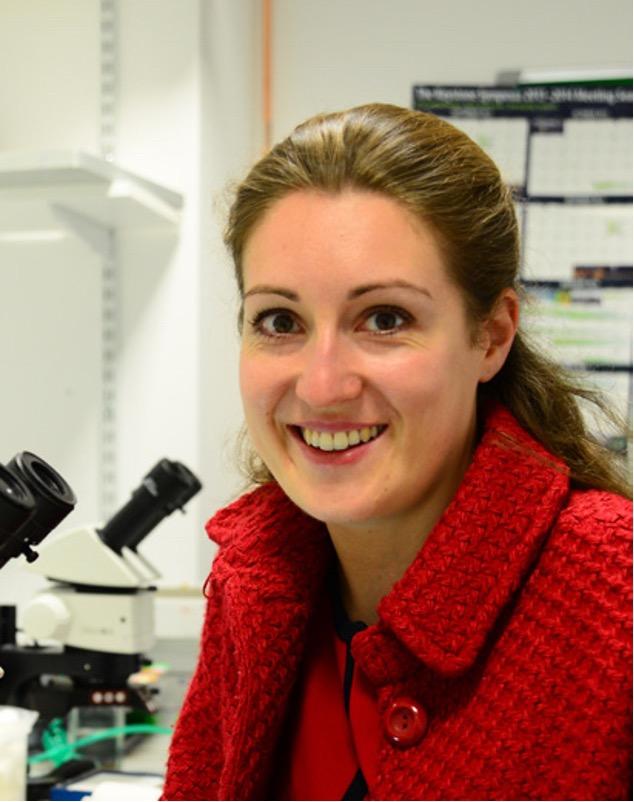Dear colleagues,
In today's newsletter, we will announce our next webinar on the topic “Inter-tissue communication”. We will also share with you a summary of April’s “Redox control of aging” webinar, in case some of you didn’t have the chance to join. At the end of the newsletter, as always, you can also find a collection of upcoming events with important deadlines and some suggestions of interesting redox reads recently published.
Webinar series “Emerging leaders in redox biology”
Our next webinar will be on 7th May 2024 at 15:00 CET on the topic “Inter-tissue communication” featuring Cristina Mas-Bargues and Renato Simoes Gaspar.  Redox modulation in aging mediated by stem cell-derived extracellular vesicles
Redox modulation in aging mediated by stem cell-derived extracellular vesicles
Cristina Mas-Bargues, PhD
Department of Physiology, School of Medicine, University of Valencia, Spain
Cristina Mas-Bargues started her research on stem cell aging and oxidative stress. She obtained her PhD in 2017 at the University of Valencia, and performed two stays during her predoc and postdoc training at the University of California at Berkeley, and at the Albert Einstein College of Medicine at New York, respectively. She is currently an Assistant Professor working at the Department of Physiology, University of Valencia, Spain. Nowadays, her research focuses on extracellular vesicles obtained from stem cells, and their application on regenerative medicine.
 Thinking redox outside of the cell: how an ER-resident chaperone governs cellular adhesion and the extracellular matrix
Thinking redox outside of the cell: how an ER-resident chaperone governs cellular adhesion and the extracellular matrix
Renato Simoes Gaspar, PhD
State University of Campinas (UNICAMP), Sao Paulo, Brazil
My research interests started during my medical degree at the Federal University of Maranhão (Brazil). From there, I developed a marked curiosity to understand how redox processes regulate platelet physiology during my PhD at the University of Reading (UK) under the (super fun) supervision of Prof Jonathan Gibbins. At the start of the COVID pandemic, I decided to go back to Brazil and pursue a postdoctoral fellowship with Dr Francisco Laurindo at the Heart Institute of the University of São Paulo. There I studied how an extracellular thiol isomerase, PDIA1, influenced platelet-endothelium interaction in hyperglycemia. This work has sparked my curiosity towards proteins of the extracellular matrix (ECM) and has developed into an independent research grant. Currently, I am starting my laboratory focused on ECM proteins (aka the ECM lab) at the State University of Campinas (UNICAMP), in Brazil. We aim to find mechanisms that explain how cells of the cardiovascular system "sense" modified ECM proteins and how these are relevant to cardiovascular diseases.
April’s webinar
On April’s webinar we enjoyed two inspiring talks on the topic “Redox control of aging” by Daphne Bazopoulou and Helena Cochemé.
The impact of early-in-life redox signaling in health, aging and disease
Daphne Bazopoulou, PhD
Biology of Stress and Aging Lab, Department of Biology, University of Crete, Greece
Dr. Bazopoulou gave a fascinating talk about early life events that can shape organismal health in the long term and the aging process, focusing on recent observations on ROS and the implication of redox regulated events in these processes.
For their work they use C. elegans since they are an optimal animal model to study individual aging. Using C. elegans with Grx1-roGFP2 they saw that oxidation levels arise during adulthood and in the early developmental stages. This highly oxidized environment in early developmental stages is critical for redox signaling whereas during late adulthood is associated with oxidative damage. They saw that during development, the worms which showed increased oxidation levels had improved homeostasis and that it was due to an epigenetic modifier (H3K4 trimethylation) and that this gave the worms increased stress resistance and longer lifespan. They came up with the question: might ROS be a universal pro-longevity signal? In order to find an answer, they are focusing on two mechanisms: dietary restriction and host-microbiome interactions. Very interestingly, they found that ROS via H3K4me3 are implicated in lifespan regulation conferred by dietary restriction and that ROS act via bacterial metabolism to regulate host lifespan. Finally, she showed results of their investigation on the redox regulation of host-immune responses. 105 immune genes were upregulated upon mild oxidation in developing worms. When exposing worms to pathogenic bacteria, their oxidation levels increased and H3K4me3 levels drastically decreased. 
Redox signaling in aging
Helena Cochemé, PhD
Redox Metabolism Group, MRC Laboratory of Medical Sciences, London, United Kingdom
Dr. Cochemé gave an interesting talk on the important role of redox signaling in aging. Her interest in redox signaling and aging started during her PhD and Postdoc, where she found that levels of mitochondrial H2O2 increase with age in Drosophila. Afterwards, she wanted to follow up on what the consequences of the increased ROS production are.
Helene showed that upregulation of catalase in Drosophila leads to lifespan extension. Moreover, the flies were very resistant to oxidative stress but interestingly, the flies were more sensitive to starvation. No differences were found in TAG or glycogen leading to the hypothesis that autophagy might be involved. Indeed, autophagy is induced in the catalase overexpressed flies, with Atg4a playing an important role. Her group found that catalase overexpression quenches redox signaling by H2O2 alering redox signaling at the levels of Atg4a. This oxidizing shift of a catalytic cysteine in Atg4a mimics an internal state of oxidation that leads to upregulation of autophagy. By changing the redox-sensitive cysteine is Atg4a to a redox-insensitive serine, autophagy induction by catalase is prevented and lifespan extension is lost. Remarkably, a single residue can exert profound effects on both metabolism and survival.
SFRR-E Visiting Fellowships 2024
Are you planning on doing a short period in another lab to boost your research? Remember that the SFRR-E is offering several Visiting Fellowships and that the call will be open until 15 May 2024. Awards of up to €2000 will be made to Early Career Investigators to cover travel and accommodation expenses for a short research stay (minimum 3 weeks) in another European laboratory, to be completed before June 2025.
Applicants should submit a single PDF containing:
- a brief summary of the research project (maximum one A4 page) stating the expected duration, budget, rationale and expected outcomes from the short stay.
- CV (maximum 2 A4 pages) of the applicant including date of birth, date of PhD award (if applicable), current position and a list of publications.
- abbreviated CVs of both the home and proposed host supervisors (maximum 2 A4 pages each).
- a letter from the host institution agreeing to host and provide facilities for the visitor.
Hurry up, the deadline for applications is 15 May 2024, and the results will be announced at the General Assembly of SFRR-E, held during the SFRR-Europe Annual Meeting in Istanbul, 4-7 June 2024.
Requirements for the applicant:
- Under 35 years of age and without a permanent university position
- Member of SFRR-Europe
- Presentation of a brief written report, and details of expenditure, to the SFRR-Europe Executive one month after the research visit. The report may be posted on the SFRR-Europe website.
Requirements for the supervisors at the home and host institutions:
- Both the home and host supervisors must be members of SFRR-Europe
Good luck!
SFRR-E Elections 2024
In May, the SFRR-E Elections for President-Elect, Treasurer, General Secretary, Meeting Officer and ten ordinary members of the Council will take place.
During the period of 1st May until 30th May 2024, members may vote electronically via a secure online voting system within the SFRR-E website (intranet.sfrr-europe.org) for the positions available by election. The results of the elections will be reported at the General Assembly during the SFRR-E Annual Meeting that will be held in Istanbul on 5-7 June 2024.
Do not forget to vote!
More information about the ECR Subcommittee can be found on the SFRR-E website ECR Committee (sfrr-europe.org), while regular updates can be found on Twitter (@SFRR_Europe), Instagram (@sfrr_ecr) and LinkedIn (SFRR-E). For any question or suggestion you might have, you can contact us via email:
Hope to see you online for our next Webinar Series appointment,
The ECR subcommittee
Upcoming events:
6th International Conference on Reactive Oxygen and Nitrogen Species in Plants
29 - 31 May 2024
Location: Antibes Juan-les-Pins, France
Deadlines: Early bird registration: 31 March 2024
Further information: https://www.alphavisa.com/pog/2024/index.php
SFRR-E Annual Meeting
5 - 7 June 2024
Location: Istanbul, Turkey
From Molecules to Tissues: Redox Biology in Action
Further information: https://www.redoxistanbul2024.com/
6th International Aryl Hydrocarbon Receptor (AHR) Meeting 2024
12 - 15 June 2024
Location: Düsseldorf, Germany
Deadlines: Registration: 31 May 2024
Further information: https://ahr-2024.de
Thiol-Based Redox Regulation and Signaling Gordon Conference
GRS: 13 - 14 July 2024
Deadline: applications must be submitted by 15 June 2024, any applicants who wish to be considered for an oral presentation should submit their application by 7 April 2024.
Further information:
https://www.grc.org/thiol-based-redox-regulation-and-signaling-grs-conference/2024/
GRC: 14 - 19 July 2024
Deadline: applications must be submitted by 16 June 2024
Location: Castelldefels, Barcelona, Spain
Further information:
https://www.grc.org/thiol-based-redox-regulation-and-signaling-conference/2024/
11th International Conference on Oxidative Stress in Skin Medicine and Biology
12 - 15 September 2024
Location: Andros Island, Greece, Greece
Deadlines:
Abstract Submission: 30 June 2024
Further information: http://oxstress.pharm.uoa.gr
FEBS Advanced Lecture Course
Redox biochemistry: cellular responses and disease relevance
30 September - 6 October 2024
Location: Spetses, Greece
Deadlines:
YTF and Grant Applications: 15 April 2024
Registration & Abstract Submission Closing: 15 April 2024
Further information: https://redoxbiochemistry2024.febsevents.org
HNE Club Meeting
Lipid Oxidation: New Biochemical Insights and Clinical Applications
10 - 12 October 2024
Location: Genoa, Italy
Deadlines:
Abstract submission: 30 April 2024
Further information:
https://www.sfrr-europe.org/media/attachments/2024/03/07/new_hne_flyer.pdf
SfRBM 2024 Conference
31st Annual Conference
20 - 23 November 2024
Location: Savannah, Georgia, USA
Deadlines:
Online Registration & Abstract Submission Open: 10 May 2024
Abstract and Awards Deadline: 15 August 2024
Early Registration Deadline: 2 October 2024
Further information: https://sfrbm.org/meetings/sfrbm-2024/
Interesting Redox Papers:
Lind, D. J., Naidoo, K. C., Tomalin, L. E., et al. Quantifying redox transcription factor dynamics as a tool to investigate redox signalling. Free Radic Biol Med (2024). https://doi.org/10.1016/j.freeradbiomed.2024.04.004
Bradford, H. F., McDonnell, T. C. R., Stewart, A., et al. Thioredoxin is a metabolic rheostat controlling regulatory B cells. Nat Immunol (2024). https://doi.org/10.1038/s41590-024-01798-w
van Soest, D. M. K., Polderman, P. E., den Toom, W. T. F., et al. Mitochondrial H2O2 release does not directly cause damage to chromosomal DNA. Nat Commun (2024). https://doi.org/10.1038/s41467-024-47008-x
Tan, J., Virtue, S., Norris, D. M., et al. Limited oxygen in standard cell culture alters metabolism and function of differentiated cells. EMBO J (2024). https://doi.org/10.1038/s44318-024-00084-7
Palma, F. R., Coelho, D. R., Pulakanti, K., et al. Histone H3.1 is a chromatin-embedded redox sensor triggered by tumor cells developing adaptive phenotypic plasticity and multidrug resistance. Cell Rep (2024). https://doi.org/10.1016/j.celrep.2024.113897
Insightful Redox Reviews:
u, K., El Zowalaty, A. E., Sayin, V. I., et al. The pleiotropic functions of reactive oxygen species in cancer. Nat Cancer (2024). https://doi.org/10.1038/s43018-024-00738-9
Donato, L., Mordà, D., Scimone, C., et al. From powerhouse to regulator: The role of mitoepigenetics in mitochondrion-related cellular functions and human diseases. Free Radic Biol Med (2024). https://doi.org/10.1016/j.freeradbiomed.2024.03.025
Jones, D. P. From powerhouse to regulator: Redox organization of living systems. Free Radic Biol Med (2024). https://doi.org/10.1016/j.freeradbiomed.2024.03.008
Karagianni, C. and Bazopoulo, D. Redox regulation in lifespan determination. JCB (2024). https://doi.org/10.1016/j.jbc.2024.105761
Vilas-Boas, E. A. and Kowaltowski, A. J. Mitochondrial redox state, bioenergetics, and calcium transport in caloric restriction: A metabolic nexus. Free Radic Biol Med (2024). https://doi.org/10.1016/j.freeradbiomed.2024.04.234
